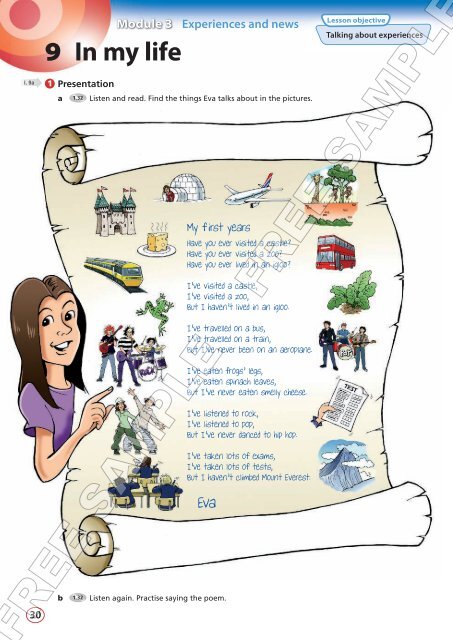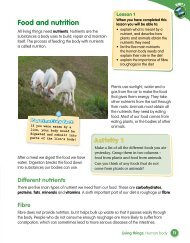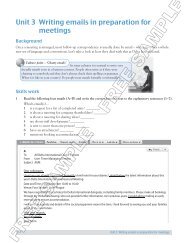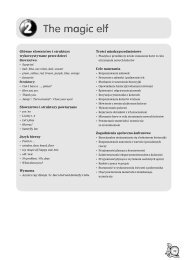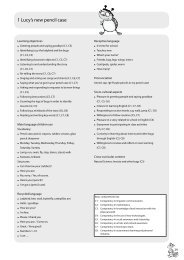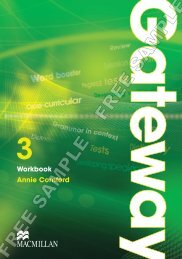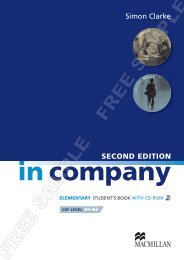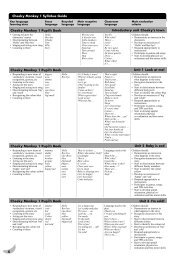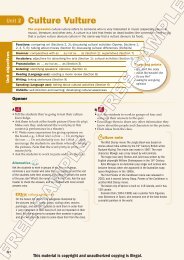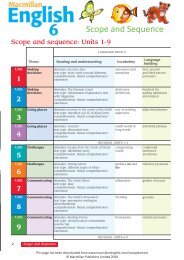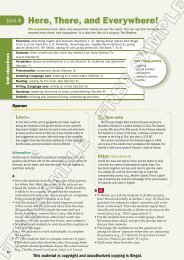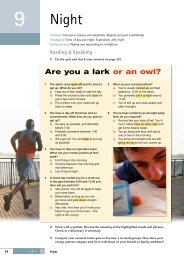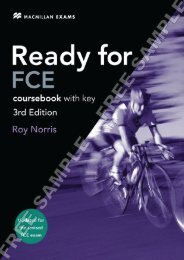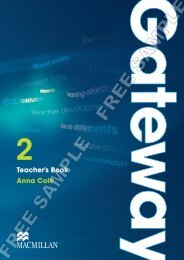9 In my life - Macmillan
9 In my life - Macmillan
9 In my life - Macmillan
You also want an ePaper? Increase the reach of your titles
YUMPU automatically turns print PDFs into web optimized ePapers that Google loves.
l. 9a<br />
30<br />
9 <strong>In</strong> <strong>my</strong> <strong>life</strong><br />
1 Presentation<br />
Module 3<br />
Experiences and news<br />
a 1.32 Listen and read. Find the things Eva talks about in the pictures.<br />
My first years<br />
b 1.32 Listen again. Practise saying the poem.<br />
Have you ever visited a castle<br />
Have you ever visited a zoo<br />
Have you ever lived in an igloo<br />
I’ve visited a castle,<br />
I’ve visited a zoo,<br />
But I haven’t lived in an igloo.<br />
I’ve travelled on a bus,<br />
I’ve travelled on a train,<br />
But I’ve never been on an aeroplane.<br />
I’ve eaten frogs’ legs,<br />
I’ve eaten spinach leaves,<br />
But I’ve never eaten smelly cheese.<br />
I’ve listened to rock,<br />
I’ve listened to pop,<br />
But I’ve never danced to hip hop.<br />
I’ve taken lots of exams,<br />
I’ve taken lots of tests,<br />
But I haven’t climbed Mount Everest.<br />
Eva<br />
Lesson objective<br />
Talking about experiences<br />
FREE SAMPLE FREE SAMPLE
9 <strong>In</strong> <strong>my</strong> <strong>life</strong><br />
Grammar<br />
• present perfect: ever, never<br />
Vocabulary<br />
• experiences<br />
Optional materials<br />
• sheets of A4 paper, one fewer than there are<br />
students in class<br />
LESSON 9a<br />
<strong>In</strong>troduction<br />
Copy the following table onto the board:<br />
Places we visit<br />
on holiday<br />
Forms of<br />
transport<br />
Unusual<br />
food<br />
Kinds of<br />
music<br />
Put students into groups of four and ask them to write as many<br />
words in each category as possible. Set a time limit of four<br />
minutes. Elicit the words from different groups onto the board and<br />
then compare how many of them appear in Activity 1 on page 30.<br />
1 Presentation<br />
a) [1.32] Focus students’ attention on the picture. <strong>In</strong>troduce<br />
Eva, the girl holding the poster with a poem. Ask students<br />
to listen and read Eva’s poem about her experiences. They<br />
should find the things she talks about in the pictures around<br />
the text. Play the CD.<br />
<strong>In</strong> pairs, students say which words from the poem the pictures<br />
illustrate. They should make guesses about new vocabulary.<br />
Point to the pictures in turn and elicit the words from the<br />
class. Make sure everybody understands all the words now.<br />
Explain any other vocabulary students may not understand.<br />
Refer students to the Grammar spot at the top of the next<br />
page to introduce the present perfect. Go over the example<br />
sentences and elicit or explain that we use the tense to talk<br />
about experiences without giving the specific time of the<br />
events. You can draw a timeline to illustrate this point (see<br />
the teaching tip below). Explain the structure of the present<br />
perfect and use the Remember! box to point out the full<br />
and short forms. Point out that regular verbs take the same<br />
form as in the past simple, but irregular verbs have a different<br />
form called the past participle. Demonstrate the past<br />
participle, using the list of irregular verbs on page 106. Refer<br />
students to the Grammar summary on page 101 for more<br />
information on the present perfect.<br />
Teaching tip: Timelines<br />
Timelines illustrate how tenses place events in time, and in<br />
relation to other events. They show complex rules in a simple<br />
visual way. The use of the present perfect is often a difficult<br />
concept for students. To clarify it, you can draw the following<br />
timeline:<br />
Explain that the cross marks a past event and the question<br />
mark shows that we do not know exactly when it happened.<br />
Optional Activity Book activities<br />
• Fast finishers p64, Extra practice p65<br />
Photocopiable activity<br />
• Experiences … p172<br />
Mixed-ability classes<br />
Fast fi nishers label the pictures in writing.<br />
Extra activity<br />
Check understanding of the poem by asking students to mark<br />
the pictures illustrating the things Eva has done in her <strong>life</strong><br />
with a tick (✔) and those she has not done with a cross (✘).<br />
Tapescript<br />
see Student’s Book Activity 1a<br />
b) [1.32] Play the CD again. Ask students to practise<br />
saying the poem aloud in chorus, then in pairs, helping<br />
each other with any pronunciation problems.<br />
Extra activity<br />
Encourage students to learn the poem by heart. They can use<br />
the following techniques: repetition/reading the poem several<br />
times, using the pictures to recall the complete lines, or cover<br />
every second or third word of the poem with blu-tack and<br />
then keep covering more words as they memorise the whole<br />
lines. Ask volunteers to recite the poem to the class.<br />
Teaching tip: Using poems in class<br />
Poems can serve a variety of purposes in the classroom.<br />
Primarily they are great tools to learn about the<br />
pronunciation of individual sounds and word stress.<br />
A lot of them follow a rhyming pattern. As students<br />
are listening to the poem, ask them to identify rhyming<br />
words. Before you ask students to work on the poem<br />
creatively, make sure they can read it well and hopefully<br />
memorise it, using different techniques. Ask students<br />
to first repeat the poem after you or the recording and<br />
then to practise reading it independently with fluency<br />
and expression, making use of the punctuation. Then<br />
they should read it to a classmate or in a group. Once<br />
students know the poem well, you can ask them to<br />
replace rhyming words with other rhyming words or write<br />
their own stanza following the pattern of the poem. This<br />
way students are encouraged to work on pronunciation<br />
and vocabulary, looking for words that rhyme with<br />
each other, as well as grammar, particularly tenses and<br />
sentence structure.<br />
Tapescript<br />
see Activity 1a<br />
T 30<br />
FREE SAMPLE FREE SAMPLE
l. 9b<br />
31<br />
Grammar spot<br />
Present perfect: ever, never<br />
Have you ever visited a castle<br />
Yes, I have./No, I haven’t.<br />
I’ve eaten spinach.<br />
I haven’t climbed Mount Everest.<br />
I’ve never been on an aeroplane.<br />
Grammar page 101<br />
Full form<br />
I have<br />
I have not<br />
2 Grammar practice<br />
Remember!<br />
Short form<br />
I’ve<br />
I haven’t<br />
a Complete three of these phrases to make<br />
true sentences about yourself.<br />
I’ve never eaten …<br />
I haven’t tasted …<br />
I’ve listened to …<br />
I’ve visited …<br />
1 I’ve never eaten spinach.<br />
2 I’ve been to Italy.<br />
3 I’ve never danced to hip hop.<br />
I’ve travelled on a …<br />
I’ve been to …<br />
I haven’t lived in …<br />
I’ve never danced to …<br />
b Read your sentences to your classmates. Try<br />
to find someone with one or two sentences like<br />
yours.<br />
Study tip<br />
Remembering past participles<br />
Write down verbs in lists of regular and<br />
irregular verbs<br />
Regular<br />
visit – visited<br />
listen – listened<br />
taste – tasted<br />
3 Pronunciation<br />
Irregular<br />
be – been<br />
eat – eaten<br />
take – taken<br />
1.33 Listen and practise saying these verbs.<br />
/ɪd/ visited shouted started ended<br />
/d/ travelled listened climbed played<br />
/t/<br />
danced worked helped watched<br />
4 Speaking<br />
a 1.34 Listen and read these questions.<br />
Experiences Have you ever …<br />
1<br />
played tennis<br />
2<br />
been to London<br />
swum in the sea<br />
seen a rainbow<br />
eaten Chinese food<br />
won a prize<br />
b Now ask and answer the questions with a<br />
classmate.<br />
Have you ever played tennis<br />
5 Class poll<br />
No, I haven’t.<br />
or<br />
Yes, I have.<br />
1.35 Listen to the questions in Activity 4 again.<br />
Put your hand up for all the things you have<br />
done. Write the results on the board.<br />
Yes, I have No, I haven’t<br />
1 Tennis 9 11<br />
2 London …<br />
6 Check your English<br />
Complete with have, haven’t, ever, never.<br />
A: Have you 1 eaten Mexican food<br />
B: No, I’ve 2 eaten Mexican food, but I 3<br />
eaten Spanish food. Have you 4 eaten<br />
Spanish food<br />
A: No, I 5 .<br />
4<br />
5<br />
3 6<br />
FREE SAMPLE FREE SAMPLE<br />
31<br />
3
2 Grammar practice<br />
a) Go over the phrases in the box and point out that some<br />
are positive and some negative. Explain that we say been<br />
to + a place or an event. Students choose three phrases<br />
and complete them with their own ideas to make true<br />
sentences about themselves. Demonstrate the task by<br />
reading out the example.<br />
Mixed-ability classes<br />
For less confi dent students write on the board categories of<br />
words which go with each verb, e.g. eaten + type of food.<br />
b) Students read their sentences to their classmates. If<br />
anyone has the same sentence/s, they should raise their<br />
hand. If you have a large class, do this activity in groups.<br />
Extra activity<br />
Place chairs or sheets of A4 paper in a circle, one chair/sheet<br />
of paper less than there are students in class. Copy the phrases<br />
from Activity 2a onto the board. Students sit on the chairs/stand<br />
on the sheets of paper. A volunteer goes to the middle of the<br />
circle and makes a true sentence about their experience with<br />
one of the phrases on the board, e.g. I’ve never eaten sushi.<br />
Students who share the same experience change seats/stand on<br />
a different sheet of paper. As they are moving, the person in the<br />
middle tries to grab a vacated chair/stand on a vacated sheet of<br />
paper. If they succeed, another person is left in the middle and<br />
they repeat the activity with another sentence. Set a time limit of<br />
fi ve minutes for the game.<br />
Homework suggestions<br />
1 Activity Book pages 20–21, Activities 1–3<br />
2 Students write true sentences for themselves about the<br />
activities in the pictures in Activity 1, e.g. I have never visited a<br />
castle.<br />
LESSON 9b<br />
<strong>In</strong>troduction<br />
Write the following verbs from Activity 1 on the board: travel,<br />
take, climb, eat, dance, visit, live, be. <strong>In</strong> pairs, students decide<br />
which verbs are regular and which irregular and write down<br />
their past participle form. Check the answers with the whole<br />
class.<br />
Dyslexia tip: Notes on the board<br />
Make sure that the notes on the board are large and clear<br />
and that dyslexic students can see them well from where<br />
they are sitting. Use different colours for different types of<br />
words or different sentences. Leave the notes on the board<br />
as long as possible so that dyslexic students have time to<br />
copy them.<br />
Study tip<br />
Go over the example lists of verbs. Encourage students to<br />
add verbs in the infinitive and the past participle to the<br />
correct category as they come across them.<br />
3 Pronunciation<br />
[1.33] Explain that there are three ways of pronouncing<br />
the regular verb -ed ending, depending on the final<br />
sound of the infinitive form of the verb: if it is /t/ or /d/,<br />
then we pronounce the ending /Id/, if it is a vowel or a<br />
voiced sound, we pronounce the ending /d/ and if it is a<br />
voiceless consonant, the ending is /t/.<br />
You can ask students to place their finger gently on their<br />
throat and say different consonants; if the vocal cords<br />
vibrate, the consonants are voiced. Play the CD with the<br />
three types of pronunciation of the -ed ending and ask<br />
students to repeat the verbs. Then encourage them to<br />
practise pronunciation of the verbs independently.<br />
Tapescript<br />
see Student’s Book Activity 3<br />
4 Speaking<br />
a) [1.34] Students listen and read the questions and<br />
think about their own true answers. Play the CD. Ask<br />
students to use the pictures to help them understand the<br />
questions.<br />
Tapescript<br />
see Student’s Book Activity 4a<br />
b) <strong>In</strong> pairs, students ask and answer the questions from<br />
Activity 4a to find out about each other’s experiences.<br />
Demonstrate the task by reading out the example with a<br />
confident student.<br />
Extra activity<br />
Before students begin asking questions, encourage them to<br />
predict their classmate’s answers. They should put a cross (✘)<br />
for no and a tick (✔) for yes beside each question and then<br />
interview their classmate. They get one point for each correct<br />
guess.<br />
Photocopiable activity<br />
Experiences p172; instructions p156<br />
5 Class poll<br />
[1.35] Play the CD again, pausing after each question.<br />
Students put their hands up if their answer is Yes, I have.<br />
Two volunteers count how many students have and have<br />
not had each experience and write the results on the<br />
board as in the example. Find out which experience is the<br />
most common and ask students to justify it, e.g. Most<br />
students have swum in the sea because our town is near<br />
the sea.<br />
Tapescript<br />
see Activity 4a<br />
6 Check your English<br />
Students complete the dialogue with have, haven’t,<br />
ever, or never and compare their answers in pairs. Ask<br />
one pair to read out the dialogue to the whole class.<br />
Extra activity<br />
A volunteer stands with their back to the board. Write one of the<br />
verbs from the lesson on the board, e.g. played. Students make<br />
present perfect sentences with the verb, but replacing the verb<br />
with beep, e.g. I’ve never beep the piano. The volunteer tries to<br />
guess the <strong>my</strong>stery verb.<br />
Answer key<br />
1 ever 2 never 3 have 4 ever 5 haven’t<br />
Homework suggestions<br />
1 Activity Book page 21, Activities 4–6<br />
2 Students write three questions with Have you ever … to add<br />
to the survey in Activity 4a. They can illustrate the questions. At<br />
the beginning of the next lesson they can use the questions to<br />
interview their classmates.<br />
49 T 31<br />
FREE SAMPLE FREE SAMPLE
l. 10a<br />
32<br />
10 An amazing <strong>life</strong><br />
1 Presentation<br />
a 1.36 Listen and read. Find the things Mandy talks about in the picture.<br />
Sam Wow. Look at these!<br />
Mandy Yes, Grandpa’s been all over the world. Look.<br />
He’s ridden an elephant in <strong>In</strong>dia.<br />
Pam Cool. Has he ever climbed Mount Everest<br />
Mandy No, he’s never climbed Mount Everest. But he’s<br />
climbed Mount Kilimanjaro and that’s the highest<br />
mountain in Africa.<br />
Pam Wow! What else has he done<br />
Mandy Well, he’s written lots of books and he’s made<br />
films.<br />
Sam Has he written any children’s books<br />
Mandy No, he hasn’t written any children’s books. But<br />
he’s written lots of travel books. And he’s met a<br />
king and a queen and he’s broken …<br />
Sam His leg!<br />
Mandy No, he hasn’t broken his leg. He’s broken world<br />
records. Look. He’s sailed around the world in<br />
80 days and he’s skied down Mont Blanc. Yes,<br />
Grandpa has had a really amazing <strong>life</strong>.<br />
Pam Umm. No wonder he’s tired.<br />
b 1.36 Listen again. Then<br />
read the dialogue with your<br />
classmates.<br />
2 Class poll<br />
What do you think is the most amazing thing<br />
Gordon Gloom has done in his <strong>life</strong> Vote and write<br />
the results on the board.<br />
ridden an elephant – 2<br />
climbed Mount Kilimanjaro – 5<br />
Cool<br />
No wonder…<br />
Real<br />
English<br />
Lesson objective<br />
Talking about experiences<br />
you have had in your <strong>life</strong><br />
Grammar spot<br />
Present perfect<br />
Has he ever climbed Mount Everest<br />
Yes, he has./No, he hasn’t.<br />
He’s ridden an elephant in <strong>In</strong>dia.<br />
He hasn’t written any children’s books.<br />
Grammar page 101<br />
FREE SAMPLE FREE SAMPLE
10 An amazing <strong>life</strong><br />
Grammar<br />
• present perfect and past simple<br />
Vocabulary<br />
• travel; geography; experiences<br />
Optional materials<br />
• one slip of paper per student<br />
LESSON 10a<br />
<strong>In</strong>troduction<br />
<strong>In</strong>dividually, students write sentences on paper about three<br />
experiences they have had e.g. I’ve played rugby. One<br />
sentence should be false. Provide help with new vocabulary.<br />
<strong>In</strong> pairs, students exchange their sentences and guess which<br />
one is false about their classmate. Ask students to keep their<br />
sentences for a later stage of the lesson.<br />
1 Presentation<br />
a) [1.36] Focus attention on the pictures and ask students<br />
to identify the members of the Gloom family: Mandy,<br />
Sam, Pam and Gordon. Elicit that they are in Gordon’s<br />
bedroom where there are a lot of souvenirs, books and<br />
photos connected with travelling.<br />
Ask students to listen and read and find the things<br />
Mandy talks about in the first picture. Play the CD twice,<br />
the second time getting students to point to the relevant<br />
fragments of the picture.<br />
Clarify any vocabulary students do not understand. Refer<br />
them to Real English and demonstrate the meaning of<br />
the phrase, by telling students I slept two hours last night<br />
and then The last meal I had was breakfast yesterday<br />
morning to elicit No wonder you’re sleepy and No<br />
wonder you’re hungry respectively.<br />
Refer students to the Grammar spot to elicit or explain<br />
the present perfect for the third person singular. Go<br />
over the different types of sentences in the example<br />
and encourage students to find more present perfect<br />
third person singular sentences in the dialogue. Use the<br />
Remember! box on the next page to point out the full<br />
and short forms of has. Remind students that we use the<br />
present perfect to talk about events which happened in<br />
the past but we do not know when or it is not important.<br />
Give a few examples of your family members’ or friends’<br />
experiences, e.g. My cousin has dived in the Red Sea.<br />
Encourage volunteers to talk about some experiences of<br />
their family or friends. Refer students to the Grammar<br />
summary on page 101 for more information on the<br />
present perfect.<br />
Optional Activity Book activities<br />
• Fast finishers p64, Extra practice p65<br />
Photocopiable activity<br />
• Do you know anybody who … p173<br />
Teaching tip: Using pictures from the Student’s book<br />
You can use pictures from the Student’s book in more ways<br />
than the Student’s book tasks directly related to them, e.g.:<br />
• ask students who, what, where, when, why and how<br />
questions about the pictures<br />
• revise parts of speech by asking students to write<br />
adjectives, nouns and verbs from the pictures<br />
• practise spelling or pronunciation by getting students to<br />
find words beginning with or ending in given letters or<br />
containing given sounds<br />
• elicit ideas about what happened before and after the<br />
situation in the pictures<br />
• use the pictures as a beginning of a story students need<br />
to continue in writing or orally as a one sentence game<br />
• ask students to write captions for the pictures.<br />
Tapescript<br />
see Student’s Book Activity 1a<br />
b) [1.36] <strong>In</strong> groups of three, each student takes a role from<br />
the dialogue in Activity 1a. Play the CD again for students<br />
to pay attention to pronunciation and intonation. Then<br />
students read the dialogue within their groups. You can<br />
ask them to repeat the activity, changing roles.<br />
Tapescript<br />
see Activity 1a<br />
Extra activity<br />
If you did the introduction activity, ask students to work in the<br />
same pairs and read through each other’s sentences, correcting<br />
the false sentence. Then put students in different pairs and ask<br />
them to report the experiences of the classmate they worked<br />
with before. They should make the present perfect third person<br />
singular sentences.<br />
2 Class poll<br />
Ask students to choose individually the most amazing<br />
thing Gordon Gloom has done in his <strong>life</strong>. <strong>In</strong>dividual<br />
students share their choice with the whole class. Students<br />
with the same answer raise their hands. Ask a volunteer<br />
to count the votes and write the results on the board as<br />
in the example.<br />
Extra activity<br />
Students think of the most amazing experiences of two of their<br />
family members or people they know well. <strong>In</strong> groups of four,<br />
students tell their classmates about the experiences, using the<br />
present perfect, e.g. My cousin has ridden a camel. Make sure<br />
they do not mention the time of the event. Groups report the<br />
most interesting experiences to the whole class.<br />
T 32<br />
FREE SAMPLE FREE SAMPLE
l. 10b<br />
33<br />
3 Grammar practice<br />
Look at the picture in Activity 1. Make<br />
sentences with He has or He hasn’t and these<br />
words:<br />
sailed written ridden skied<br />
broken made met been<br />
children’s books<br />
an elephant<br />
to lots of countries<br />
kings and queens<br />
He’s sailed around the world.<br />
down Mont Blanc<br />
films<br />
around the world<br />
his leg<br />
He hasn’t written children’s books.<br />
Full form<br />
4 Listening<br />
He/She has<br />
He/She has not<br />
Remember!<br />
Short form<br />
He/She’s<br />
He/She hasn’t<br />
a 1.37 Listen and then fill in the missing<br />
words.<br />
sailed been rode flew sailed<br />
been flown took ridden<br />
Sam Is it true Have you an elephant<br />
Gordon Yes, I an elephant in <strong>In</strong>dia in 1948.<br />
Pam And have you around the world<br />
Gordon Yes, I around the world in 1952.<br />
It me eighty days.<br />
Sam Have you ever to the moon<br />
Gordon No, I haven’t to the moon. But<br />
I have across the Pacific. Look, I<br />
across the Pacific Ocean in this<br />
plane in 1937.<br />
Pam, Sam Wow. You are brave, Grandpa.<br />
b 1.37 Listen again and check your answers.<br />
Grammar spot<br />
Present perfect and past simple<br />
Have you ridden an elephant<br />
Yes, I rode an elephant in <strong>In</strong>dia in 1948.<br />
Have you sailed around the world<br />
Yes, I sailed around the world in 1952.<br />
Grammar page 101<br />
5 Grammar practice<br />
a Complete the dialogue with the correct form of<br />
the verb in brackets.<br />
1 ridden, rode<br />
1 (ride) Sam Have you an elephant<br />
Gordon Yes, I an elephant in 1948.<br />
2 (broke) Pam Have you a world record<br />
Gordon Yes, I a world record in 1952.<br />
3 (meet) Sam Have you a king and queen<br />
Gordon Yes, I a king and queen in<br />
1960.<br />
4 (fly) Pam Have you across the Pacific<br />
Gordon Yes, I across the Pacific in<br />
1937.<br />
5 (ski) Sam Have you down Mont Blanc<br />
Gordon Yes, I down Mont Blanc in<br />
1977.<br />
6 (climb) Pam Have you Mount Kilimanjaro<br />
Gordon Yes, I Mount Kilimanjaro in<br />
1982.<br />
b 1.38 Listen and check.<br />
6 Song<br />
1.39 Find the song Have You Ever Seen the Rain<br />
on page 90.<br />
7 Check your English<br />
a Ask and answer questions about your<br />
classmate’s experiences.<br />
1 (travel) on a plane 3 (ride) a horse<br />
2 (be) to England 4 (break) a leg<br />
Have you travelled on a plane<br />
Yes, I have. I travelled on a plane last year.<br />
b Now write sentences about you and your<br />
classmate’s experiences.<br />
I haven’t travelled on a plane.<br />
Monica has travelled on a plane.<br />
She travelled on a plane last year.<br />
FREE SAMPLE FREE SAMPLE<br />
33<br />
3
3 Grammar practice<br />
Students study the objects in Gordon Gloom’s bedroom in<br />
Activity 1 and write sentences about what he has and has<br />
not done, using the verbs and the phrases in the boxes.<br />
They should first match the verbs to the correct phrases.<br />
Check the answers with the whole class.<br />
Answer key<br />
He’s sailed around the world. He hasn’t written children’s books.<br />
He has ridden an elephant. He’s skied down Mont Blanc. He<br />
hasn’t broken his leg. He’s made fi lms. He’s met kings and<br />
queens. He’s been to lots of countries.<br />
Homework suggestions<br />
1 Activity Book page 22, Activities 1–2<br />
2 Students choose three celebrities and write about their<br />
amazing achievements or experiences, using the present<br />
perfect.<br />
LESSON 10b<br />
<strong>In</strong>troduction<br />
Students write their own true amazing experience on a slip<br />
of paper, e.g. I’ve won some money on a lottery. Collect the<br />
sentences, mix them up and distribute randomly. To find the<br />
author of the sentence they received students mingle and<br />
ask questions about the experience, e.g. Have you won any<br />
money on a lottery Set a time limit of four minutes.<br />
4 Listening<br />
a) [1.37] Focus attention on the verbs in the box and<br />
point out that some are past simple verbs and some<br />
are past participles. Ask students to listen and read the<br />
conversation and fill in the gaps.<br />
Tapescript<br />
see Activity 4a<br />
b) [1.37] Play the CD again for students to check their<br />
answers. Elicit or explain that we use the present perfect to<br />
talk about experiences in general, but when we say exactly<br />
when they happened and when we give details, we use<br />
the past simple. Refer students to the Grammar spot to<br />
illustrate the rule and point out the time references. Refer<br />
students to the Grammar summary on page 101 for<br />
more information.<br />
Dyslexia tip: Being an active learner<br />
Encourage dyslexic students to be active when learning new<br />
grammar and vocabulary. They can draw diagrams, pictures,<br />
use highlighter pens and different colours to help them<br />
memorise new concepts and meanings. <strong>In</strong> the case of the<br />
present perfect vs the past simple, students can use different<br />
colours for each tense, draw calendar pages to illustrate the<br />
time references and use arrows to show movement from one<br />
tense to the other.<br />
Tapescript and Answer key<br />
Sam: Is it true Have you ridden an elephant<br />
Gordon: Yes, I rode an elephant in <strong>In</strong>dia in 1948.<br />
Pam: And have you sailed around the world<br />
Gordon: Yes, I sailed around the world in 1952. It took me<br />
eighty days.<br />
Sam: Have you ever been to the moon<br />
Gordon: No, I haven’t been to the moon. But I have fl own<br />
across the Pacifi c. Look, I fl ew across the Pacifi c<br />
Ocean in this plane in 1937.<br />
Pam, Sam: Wow. You are brave, Grandpa.<br />
5 Grammar practice<br />
a) Students complete the short dialogues with the verbs in<br />
brackets in the correct form: the present perfect or the<br />
past simple. Then they compare their answers in pairs.<br />
Mixed-ability classes<br />
Ask less confi dent students to circle the year references to remind<br />
them to use the past simple form in these sentences.<br />
b) [1.38] Play the CD for students to check their answers.<br />
Extra activity<br />
Students write a sentence about an amazing experience they<br />
have had or use the sentence from the introduction activity. <strong>In</strong><br />
pairs, students read their sentence to each other and make a<br />
dialogue based on their experience, using Activity 5 as a model<br />
and adding more details in the past simple, e.g. why, where, how<br />
it happened.<br />
Tapescript and Answer key<br />
1 Sam: Have you ridden an elephant<br />
Gordon: Yes, I rode an elephant in1948.<br />
2 Pam: Have you broken a world record<br />
Gordon: Yes, I broke a world record in 1952.<br />
3 Sam: Have you met a king and queen<br />
Gordon: Yes, I met a king and queen in 1960.<br />
4 Pam: Have you fl own across the Pacifi c<br />
Gordon: Yes, I fl ew across the Pacifi c in 1937.<br />
5 Sam: Have you skied down Mont Blanc<br />
Gordon: Yes, I skied down Mont Blanc in 1977.<br />
6 Pam: Have you climbed Mount Kilimanjaro<br />
Gordon: Yes, I climbed Mount Kilimanjaro in 1982.<br />
Photocopiable activity<br />
Do you know anybody who … p173; instructions p157<br />
6 Song<br />
[1.39] Refer students to page 90. Ask them to look briefly<br />
at the lyrics and play a few seconds of the recording.<br />
Find out if students recognise the song and play the CD<br />
through.<br />
Explain any words students do not understand. Play the<br />
song again, encouraging students to join in singing. Elicit<br />
what the song is about and ask students to read the<br />
background information.<br />
Tapescript<br />
see lyrics on page 90 of the Student’s Book<br />
7 Check your English<br />
a) Students make present perfect questions, using the<br />
prompts, and then ask and answer them in pairs.<br />
Answer key<br />
1 Have you travelled …<br />
2 Have you been …<br />
3 Have you ridden …<br />
4 Have you broken …<br />
b) Students write sentences about their own and their<br />
classmate’s experiences from Activity 7a. Go through the<br />
example before students begin the task.<br />
Homework suggestions<br />
1 Activity Book page 23, Activities 3–5<br />
2 Students imagine three more amazing experiences Gordon<br />
Gloom has had. They write sentences about them in the<br />
present perfect and the past simple as in Activity 7b.<br />
T 33<br />
FREE SAMPLE FREE SAMPLE
l. 11a<br />
34<br />
11 My latest news<br />
1 Guessing<br />
Phoebe is writing about things that have happened to her recently.<br />
Look at the picture. Can you guess her news<br />
2 Presentation<br />
1.40 Listen and read. How many pieces of news<br />
does Phoebe tell her cousin in Australia<br />
How r u Do you<br />
fancy a sleepover<br />
2nite @ mine<br />
Let me kno.<br />
Hope to CU L8R.<br />
Julie<br />
Guess what pal<br />
Real English<br />
Annoying! gorgeous<br />
Text language<br />
do u (= do you) tonite (= tonight)<br />
r (= are) @ ( = at) kno (= know)<br />
CU = (see you) L8R (= later)<br />
Lesson objective<br />
Announcing news<br />
Grammar spot<br />
Present perfect: just<br />
I’ve just started <strong>my</strong> new school.<br />
Bonnie has just had three kittens.<br />
Grammar page 101<br />
FREE SAMPLE FREE SAMPLE
11 My latest news<br />
Grammar<br />
• present perfect: just; present perfect and past<br />
simple<br />
Vocabulary<br />
• everyday activities; shopping<br />
LESSON 11a<br />
<strong>In</strong>troduction<br />
On the board write the following heading: MIELSA and three<br />
questions:<br />
Who do you usually write them to<br />
What do you usually write about<br />
What was the last one you wrote about<br />
Ask students to read the questions and guess what topic<br />
they refer to. Then they rearrange the letters in the heading<br />
to check their answer (answer: EMAILS) Divide students into<br />
groups of four and ask them to discuss the questions. Groups<br />
report the results of their discussion to the whole class.<br />
1 Guessing<br />
Focus students’ attention on the picture of Phoebe<br />
typing on her computer. Point to her thought bubble<br />
and explain that she is thinking about things that have<br />
happened to her and her family recently. Ask students<br />
to identify the people in the thought bubble: Phoebe’s<br />
mum, dad and her brother, Oscar. Point to the message in<br />
the bottom left-hand corner and elicit it is from Phoebe’s<br />
friend. Students should then try to guess Phoebe’s news<br />
on the basis of the pictures. <strong>In</strong> pairs, students compare<br />
their ideas.<br />
2 Presentation<br />
[1.40] Point to Phoebe’s computer and explain that she<br />
is writing an email to her cousin, Sandra, who lives in<br />
Australia. Elicit that she is writing about her news. Explain<br />
that we say: a piece of news when we want to count it<br />
as news is singular and uncountable in English. Students<br />
listen and read the email to count the pieces of news<br />
Phoebe tells her cousin and check their guesses from<br />
Activity 1. Play the CD.<br />
Elicit the answers. Refer students to Real English and<br />
demonstrate the meaning of the words and phrases by<br />
asking questions to different students, e.g. What do we<br />
say before we give exciting news Who are Harry Potter’s<br />
best pals What animals do you think are gorgeous<br />
Scratch the board with your fingernails to elicit Annoying!<br />
Point to the Text language section and elicit or explain<br />
in L1 that text language is a type of slang where words<br />
are abbreviated or simplified so that typing is faster<br />
and we need fewer characters. Make sure students<br />
understand it is used between young people in text<br />
messages or instant messages.<br />
Students read the instant message in the picture again.<br />
Ask them to explain what it says in their own words.<br />
Provide help if necessary. Find out if students use any<br />
abbreviations in their own text or instant messages.<br />
Optional Activity Book activities<br />
• Fast finishers p64, Extra practice p65<br />
Photocopiable activity:<br />
• What’s just happened p174<br />
Check if students know or can guess the meaning of the<br />
following words and phrases from the email: uniform,<br />
hairstyle, had kittens, birthday money, at a vet’s, get<br />
ready. Explain any words students still find difficult.<br />
Refer students to the Grammar spot to elicit or explain<br />
the use of the present perfect to report news. Explain that<br />
we often use just with the present perfect, which refers<br />
to a short time ago. When we use the present perfect, it<br />
means that we can still see the results of the event, e.g.<br />
I’ve changed <strong>my</strong> hairstyle – Phoebe’s hair is now different<br />
to what it looked like before. Refer students to the<br />
Grammar summary on page 101 for more information<br />
on the present perfect with just.<br />
Cultural information<br />
Text language is the English language slang used mainly in SMSs<br />
(Short Message Service, a form of text messaging on mobile<br />
phones) and IMs (<strong>In</strong>stant Messages, text-based communication<br />
between people over the <strong>In</strong>ternet). It cannot usually be found<br />
in standard dictionaries. To use the fewest number of characters<br />
and speed up typing common words are abbreviated, replaced<br />
by numbers, or their spelling is simplifi ed. You can introduce<br />
some common abbreviations your students may want to use in<br />
their own text or instant messages, e.g. plz=please, sry=sorry,<br />
thx=thanks, bf=boyfriend, gf=girlfriend, love=luv, np=no<br />
problem, cu l8r=see you later, 4=for, u=you.<br />
Tapescript<br />
see Student’s Book Activity 2<br />
Answer key<br />
1 Phoebe has just started her new school.<br />
2 She has changed her hairstyle.<br />
3 Her cat has just had three kittens.<br />
4 Oscar has just bought an MP3 player.<br />
5 Her mum and dad have been busy with DIY.<br />
6 They have just painted the kitchen.<br />
7 Her dad has hurt his back.<br />
8 Her mum has found a new job at a vet’s.<br />
9 Her pal Julie has just invited her for a sleepover.<br />
Extra activity<br />
Write the following exclamations on the board: Oops! Ouch!<br />
Wow! Sorry! Phew! How nice! Help! Elicit when we use<br />
them. <strong>In</strong> pairs, students make short dialogues orally, using the<br />
exclamations and the present perfect with just. Write a sample<br />
dialogue on the board:<br />
A: Oops!<br />
B: What’s happened<br />
A: I’ve just dropped <strong>my</strong> glasses.<br />
Set a time limit of eight minutes. Elicit one or two dialogues for<br />
each exclamation.<br />
T 34<br />
FREE SAMPLE FREE SAMPLE
l. 11b<br />
35<br />
3 Grammar practice<br />
a Match the words in A with the words in B to<br />
make sentences using the present perfect.<br />
I’ve just started <strong>my</strong> new school.<br />
A<br />
B<br />
1 I just (start) a an MP3 player.<br />
2 I (change) b his back.<br />
3 Bonny just (have) c really busy.<br />
4 Oscar just (buy) d <strong>my</strong> hairstyle.<br />
5 Mum and Dad (be) e kittens.<br />
6 They just (paint) f a new job at a vet’s.<br />
7 My dad (hurt) g me to a sleepover.<br />
8 Mum (find) h the kitchen.<br />
9 Julie just (invite) i <strong>my</strong> new school.<br />
b 1.41 Listen and check.<br />
4 Listening<br />
a 1.42 Listen. What news is Oscar telling his<br />
friend<br />
b 1.42 Listen again. Answer these questions.<br />
1 What has Oscar just spent<br />
2 What did he buy<br />
3 Was it expensive<br />
4 Where did he buy it<br />
5 How many songs can it hold<br />
6 How many songs has Oscar put on it<br />
Grammar spot<br />
Present perfect and past simple<br />
I’ve just spent <strong>my</strong> birthday money.<br />
What did you buy<br />
I bought an MP3 player.<br />
5 Speaking<br />
Work with a classmate. Make a dialogue with<br />
the words in the boxes. Complete it with your<br />
own answer.<br />
I’ve just been shopping.<br />
I bought a magazine.<br />
A: I’ve just …<br />
What did you buy<br />
been shopping won a prize read a book<br />
seen a film had a drink played a game<br />
B: What did you …<br />
buy win read see have play<br />
A: I …<br />
bought won read saw had played<br />
My English file<br />
My latest news<br />
Write a short email to your friend. Start with saying<br />
thank you and write about your latest news.<br />
Hi Peter,<br />
A big thank you for your last email/phone call/<br />
birthday present. Ive got some news, too. My<br />
parents have just bought me a puppy! Its ...<br />
Real English<br />
Saying thank you<br />
Thanks for ... Thanks a lot for ...<br />
Thank you so much for ...<br />
A big thank you for ...<br />
6 Check your English<br />
a Complete with the present perfect of the<br />
verb in brackets.<br />
1 I just a T-shirt. (buy)<br />
2 My cat just kittens. (have)<br />
3 My friend just a new school. (start)<br />
4 We our house. (paint)<br />
5 My dad a new job. (find)<br />
b Now write questions about the above with<br />
the past simple.<br />
1 Where did you buy it<br />
FREE SAMPLE FREE SAMPLE<br />
35<br />
3
3 Grammar practice<br />
a) Students match the words in column A with words in<br />
column B. Check the answers. Then students make<br />
sentences about Phoebe’s news, using the joint phrases<br />
and the present perfect. They should pay special attention<br />
to the position of just in the sentence and whether the<br />
subject is singular or plural as they require different forms<br />
of have. Students compare their answers in pairs and<br />
then check with the email in Activity 2.<br />
Mixed-ability classes<br />
Fast fi nishers imagine that Julie has made some preparations<br />
for the sleepover at her house. They write three sentences about<br />
what she has done, using the present perfect, e.g. Julie’s just<br />
made pancakes for the evening.<br />
b) [1.41] Play the CD for students to check their answers.<br />
Tapescript and Answer key<br />
1 (i) I’ve just started <strong>my</strong> new school.<br />
2 (d) I’ve changed <strong>my</strong> hairstyle.<br />
3 (e) Bonny’s just had kittens.<br />
4 (a) Oscar’s just bought an MP3 player.<br />
5 (c) Mum and Dad have been really busy.<br />
6 (h) They’ve just painted the kitchen.<br />
7 (b) My dad’s hurt his back.<br />
8 (f) Mum’s found a new job at a vet’s.<br />
9 (g) Julie’s just invited me to a sleepover.<br />
Homework suggestions<br />
1 Activity Book pages 24–25, Activities 1–3<br />
2 Students write four sentences in the present perfect with the<br />
news from their town or country.<br />
LESSON 11b<br />
<strong>In</strong>troduction<br />
Write the following words on the board: busy, kitchen, back,<br />
job at a vet’s, kittens, hairstyle, sleepover, school, MP3 player.<br />
Divide students into four groups and ask them to recall from<br />
memory Phoebe’s news in Activity 2 on the basis of these<br />
words. Set a time limit of five minutes. Then groups take it<br />
in turns to choose a word and make a sentence with it in ten<br />
seconds. If it is grammatically and factually correct, give them<br />
one point and erase the word. If it is not, leave the word on<br />
the board for other groups to choose.<br />
4 Listening<br />
a) [1.42] Elicit that the photo shows Oscar talking on the<br />
phone. Ask students to guess what news he is telling his<br />
friend. Play the CD for students to check their guesses.<br />
Elicit that Oscar is telling his friend about the MP3 player<br />
he has just bought.<br />
b) [1.42] Play the CD again and ask students to answer the<br />
questions about the conversation. Students compare their<br />
answers in pairs before you check them with the whole<br />
class. Refer students to the Grammar spot to point out<br />
we tell the news using the present perfect, but then we<br />
give details about it in the past simple.<br />
Extra activity<br />
Ask students if they or their family members do some of their<br />
shopping on-line. Find out what they usually buy and which<br />
websites are the most popular for shopping on-line.<br />
Tapescript<br />
Oscar: Guess what! I’ve just spent <strong>my</strong> birthday money.<br />
Harry: What did you buy<br />
Oscar: I bought an MP3 player!<br />
Harry: Fantastic. Was it expensive<br />
Oscar: No, it wasn’t. I bought it on-line.<br />
Harry: Cool. How many songs can it hold<br />
Oscar: 2000.<br />
Harry: Wow. How many songs have you put on it<br />
Oscar: Er …16.<br />
Harry: Only 16!<br />
Oscar: Well, I’ve just bought it!<br />
Answer key<br />
1 His birthday money 4 On-line<br />
2 An MP3 player 5 2000<br />
3 No, it wasn’t 6 16<br />
5 Speaking<br />
<strong>In</strong> pairs, students make short dialogues with the words in<br />
the boxes. They should use the first phrase in a present<br />
perfect sentence to introduce a piece of news, and then<br />
ask and answer about details, using the verbs in the<br />
second and third box in the past simple. They should<br />
complete the answers using their own ideas. The phrases<br />
and the verbs are in the same order. Read out the example<br />
with a confident student before students begin the task.<br />
Explain that the dialogues do not have to be true.<br />
Set a time limit of five minutes. Ask different pairs to<br />
repeat their dialogues to the whole class.<br />
Mixed-ability classes<br />
For less confi dent students write ideas for the answers on the<br />
board in mixed order, e.g. a milkshake, a comedy, an English<br />
dictionary, basketball, a present for <strong>my</strong> brother, £20.<br />
My English file<br />
Students’ task is to write a short email to a friend about their<br />
own news. They should start by thanking their friend as in the<br />
example or they can choose one of the expressions from the<br />
Real English box. Then they should use the present perfect<br />
to introduce their news (real or imaginary) and the past simple<br />
to talk about details. Go through the example before they<br />
begin the task.<br />
<strong>In</strong> pairs, students exchange their notebooks and point out any<br />
mistakes they see in each other’s emails.<br />
Photocopiable activity<br />
What’s just happened p174; instructions p157<br />
6 Check your English<br />
a) Students complete the sentences with the present perfect<br />
form of the verbs in brackets. <strong>In</strong> pairs, students compare<br />
their answers. Check the answers with the whole class.<br />
Answer key<br />
1 have… bought<br />
2 has … had<br />
3 has … started<br />
4 have painted<br />
5 has found<br />
b) Students write their own past simple questions to find<br />
out more about the news in Activity 6a.<br />
Homework suggestions<br />
1 Activity Book page 25, Activities 4–5<br />
2 Students write an email to a friend with their own true news,<br />
using Activity 2 as a model.<br />
T 35<br />
FREE SAMPLE FREE SAMPLE
l. 12a<br />
36<br />
12 Sumeo’s story<br />
1 Reading<br />
1<br />
My name is Sumeo and I live on the tiny island of<br />
Funafala in the South Pacifi c. This is <strong>my</strong> house. As<br />
you can see our house is very close to the sea.<br />
It isn’t good to live close to the sea on Funafala<br />
because the land is very low. Sometimes the sea<br />
floods our island.<br />
2 4<br />
Two families have just left our island to live in New<br />
Zealand. One of these was <strong>my</strong> aunt and uncle’s<br />
family. I am very sad because <strong>my</strong> cousins live so<br />
far away from Funafala. Now there are only fi ve<br />
families on the island.<br />
3<br />
Skills<br />
a 1.43 Listen and read about the Tuvaluan island of Funafala. Why<br />
do you think people on the island are afraid for its future<br />
b Read again. Are these sentences true or false<br />
1 T<br />
1 Funafala is a tiny island.<br />
2 The land on Funafala is very high.<br />
3 All the men are farmers.<br />
Cross-cultural<br />
Tuvalu fears for its future<br />
All the men on <strong>my</strong> island are fi shermen. We have<br />
just brought a big net of fi sh back to the island.<br />
We share everything on <strong>my</strong> island and now we are<br />
going to share the fi sh between the fi ve families.<br />
Fish is our main food on Funafala. We also eat<br />
chicken, pork and vegetables.<br />
We have our own language in Tuvalu and we have<br />
our own songs and dances too. We are happy<br />
tonight but we are often sad when we think of the<br />
future.<br />
4 Sumeo’s uncle and aunt live in New Zealand.<br />
5 There are only two families on Funafala.<br />
6 They are sad tonight.<br />
FREE SAMPLE FREE SAMPLE
12 Sumeo’s story<br />
Optional materials<br />
• a CD with music<br />
LESSON 12a<br />
<strong>In</strong>troduction<br />
Write the word island on the board. Divide students into<br />
groups of four and ask them to brainstorm all the words they<br />
associate with the topic. Set a time limit of two minutes and<br />
elicit all the groups’ words onto the board. Students open<br />
their books, look at the pictures in Activity 1a and check how<br />
many of their words appear there.<br />
1 Reading<br />
a) [1.43] Focus attention on the first picture and introduce<br />
the boy named Sumeo. Then point to the map and<br />
explain that he lives on the island of Funafala which is in<br />
Tuvalu, a small country in the South Pacific. Ask students<br />
to listen and read about Funafala and say why they think<br />
people living there are afraid for the island’s future. Play<br />
the CD.<br />
Check if students know/can guess the meaning of the<br />
following words and phrases: tiny, low, floods, net, share,<br />
main, one of these, so far away. Provide explanation if<br />
necessary. Point out that fish is uncountable in English.<br />
Elicit that people are afraid for Funafala’s future because<br />
the sea sometimes floods the island and families leave.<br />
Tapescript<br />
see Student’s Book Activity 1a<br />
b) Students read the text in Activity 1a again and decide if<br />
the sentences are true or false about Funafala. Encourage<br />
them to mark with pencil the relevant parts of the<br />
text which contain the answers. Set a time limit of five<br />
minutes. If your students like it, you can play music in the<br />
background for the duration of the activity.<br />
Students compare the answers in pairs. Check the<br />
answers with the whole class and elicit which parts of the<br />
text prove that the sentences are true or false.<br />
Mixed ability classes<br />
Fast fi nishers correct the false statements in writing.<br />
Photocopiable activity<br />
• <strong>In</strong>teresting stories, p175<br />
Extra activity<br />
Divide students into pairs. Ask Student A to study pictures 1 and<br />
2 in Activity 1a for thirty seconds. Then they should close their<br />
books and describe the pictures from memory to Student B.<br />
Student B checks if the description is correct and asks Student A<br />
at least one question about each picture, e.g. How many people<br />
are standing in the water Then students repeat the procedure<br />
with Student B studying, describing and answering questions<br />
about pictures 3 and 4.<br />
Teaching tip: Music in the classroom<br />
Music in the classroom can enhance concentration; it<br />
stimulates the brain, relaxes students and makes learning<br />
more enjoyable. You can find music related to the story<br />
in the textbook, e.g. Polynesian music (in the case of the<br />
reading activity above), and play it to help students make<br />
associations with a given place or topic. You can play music<br />
in the background for the duration of the activity, so when<br />
you pause it, students know that the time is up. To help<br />
students concentrate on grammar tasks use harmonic music<br />
with repeated patters, e.g. Mozart, and to stimulate ideas in<br />
brainstorming activities use music with irregular patterns.<br />
Answer key<br />
1 true 2 false (It is very low) 3 false (All the men are fi shermen)<br />
4 true 5 false (There are fi ve families) 6 false (They are happy)<br />
Cultural information<br />
Tuvalu is the fourth smallest country in the world. It is located<br />
between Hawaii and Australia in the Pacifi c Ocean. Tuvalu’s<br />
<strong>In</strong>dependence Day is on October 1st. Tuvalu comprises islands<br />
and atolls. Funafala is one of Tuvalu’s islets. The land on the<br />
islands is very low, the highest elevation is 5 metres above sea<br />
level. Because of the climate change and the resulting rise of the<br />
sea level, Tuvaluan islands can be partially or completely fl ooded<br />
and food crops may be destroyed by salt water in the future.<br />
Tuvaluan people are Polynesian people who settled on the islands<br />
2000 years ago. Due to the environmental threats they have now<br />
begun moving away to New Zealand.<br />
T 36<br />
FREE SAMPLE FREE SAMPLE
l. 12b<br />
37<br />
2 Listening<br />
a 1.44 Listen to the interview with Sumeo.<br />
Then answer these questions.<br />
1 Why is Sumeo’s house on stilts<br />
2 Why have Sumeo’s uncle and aunt left the island<br />
3 What food do they eat on Funafala<br />
4 Why are they happy tonight<br />
b 1.44 Listen again and check.<br />
3 Speaking<br />
a 1.45 Look at the pictures in Activity 1 and<br />
listen. Think about the answers.<br />
b Now play a quiz game. Get into small teams<br />
and write five questions to ask another team.<br />
c Then close your books and ask and answer<br />
your questions. You get one point for every<br />
correct answer.<br />
Why is Sumeo’s house on stilts<br />
Because it’s very close to the sea.<br />
a Match each verb with two pictures. Write your answers.<br />
1 b,m<br />
1 travel on a …<br />
2 climb a …<br />
3 make a …<br />
4 throw a …<br />
5 swim in a …<br />
6 ride a(n) …<br />
7 break a(n) …<br />
b Then make sentences with You can …<br />
You can travel on a bus.<br />
You can travel on a …<br />
4 Writing<br />
Write a paragraph about the island of<br />
Funafala. Try to use as many of these words<br />
as you can.<br />
tiny South Pacific houses close to the sea<br />
land low stilts afraid of two families<br />
floods New Zealand afraid for the future<br />
five fishermen net fish share<br />
main food chicken pork vegetables<br />
Funafala<br />
Funafala is a tiny island in the<br />
South Pacifi c. The island is …<br />
Picture quiza m…<br />
i t…<br />
j b…<br />
e j…<br />
d c…<br />
k b…<br />
FREE SAMPLE FREE SAMPLE<br />
f e…<br />
l r…<br />
b b…<br />
g a…<br />
m t…<br />
c p…<br />
h b…<br />
n l…<br />
37<br />
3
2 Listening<br />
a) [1.44] Pre-teach the word stilts. Students listen to the<br />
interview with Sumeo and answer the questions.<br />
Play the CD.<br />
Tapescript<br />
<strong>In</strong>terviewer: Hello Sumeo, can I ask you some questions about<br />
your island<br />
Sumeo: Yes, sure. Go ahead.<br />
<strong>In</strong>terviewer: OK. Tell me, why is your house on stilts<br />
Sumeo: My house is on stilts because we are afraid of the<br />
sea. Sometimes the sea fl oods our island and it<br />
can be very dangerous.<br />
<strong>In</strong>terviewer: Ah, right, I see. So, your aunt and uncle have left<br />
Funafala to live in New Zealand, is that right<br />
Sumeo: Yes, it is.<br />
<strong>In</strong>terviewer: Why have they left the island<br />
Sumeo: They are afraid for the island’s future.<br />
<strong>In</strong>terviewer: They are afraid<br />
Sumeo: Yes, because of the sea.<br />
<strong>In</strong>terviewer: You have caught a lot of fi sh today. What other<br />
food do you eat on the island<br />
Sumeo: Well, fi sh is our main food. But we also eat<br />
chicken, pork and vegetables.<br />
<strong>In</strong>terviewer: Why are you happy tonight<br />
Sumeo: We are happy tonight because we are having a<br />
celebration.<br />
b) [1.44] Play the CD again for students to check their<br />
answers. <strong>In</strong>dividual students read the questions and the<br />
answers for the whole class to check.<br />
Tapescript<br />
see Activity 2a<br />
Answer key<br />
1 Because sometimes the sea fl oods the island. 2 Because<br />
they are afraid for the island’s future. 3 Fish, chicken, pork and<br />
vegetables. 4 Because they are having a celebration.<br />
Homework suggestions<br />
1 Activity Book page 26, Activity 1<br />
2 Students write three more questions they would like to ask<br />
Sumeo about his <strong>life</strong> on the island.<br />
LESSON 12b<br />
<strong>In</strong>troduction<br />
Divide the class into two teams. Ask Team A to write as many<br />
good points about living on Funafala as they can think of.<br />
Team B writes all the bad points about living on the island. Set<br />
a time limit of four minutes. Group representatives read out<br />
their lists. The team with the longer list wins the game.<br />
3 Speaking<br />
a) [1.45] Students look at the pictures in Activity 1a again<br />
and listen to the questions. They should think about the<br />
answers.<br />
Tapescript<br />
Where is Sumeo’s island<br />
Where is Sumeo’s house<br />
Why is the house on stilts<br />
Why isn’t it good to live close to the sea<br />
How many families have left the island<br />
Where do Sumeo’s uncle and aunt live<br />
How many families now live on the island<br />
What have the fi shermen brought back to the island<br />
What food do they eat on the island<br />
Why are they happy tonight<br />
b) Put students into groups of three or four to have an<br />
even number of groups in the class. They should write<br />
five questions about Funafala to ask to another team.<br />
They can use some of the example questions they heard<br />
in Activity 3a. They need to make sure they know the<br />
answers. Set a time limit of eight minutes.<br />
c) Ask each group to work with another team. With their<br />
books closed, they take turns to ask and answer the<br />
questions. The whole team has to agree on the same<br />
answer within thirty seconds. They get one point for<br />
each correct answer. The team with more points wins the<br />
game.<br />
4 Writing<br />
Review the words in the box. <strong>In</strong>dividually, students write a<br />
paragraph describing the island of Funafala. They should<br />
use as many words from the box as possible. Ask them to<br />
write the text from memory without looking at Activity 1.<br />
They should cover page 36 with a sheet of paper. Set a<br />
time limit of twenty minutes.<br />
Encourage students to make a draft copy first and rewrite<br />
it after editing. Monitor their work, providing help.<br />
Then they exchange their texts in pairs. If they notice<br />
any mistakes in their classmate’s text, they should point<br />
these out orally. Find out how many words students have<br />
managed to use and if there is anyone who has used all<br />
the words.<br />
Mixed-ability classes<br />
Allow less confi dent students to check information in Activity 1,<br />
but ask them not to copy the sentences from there.<br />
Picture quiz<br />
a) Students match each verb with two pictures and write<br />
their answers.<br />
Answer key<br />
1 b, m (bus, train)<br />
2 a, i (mountain, tree)<br />
3 d, h (cake, bed)<br />
4 e, j (javelin, ball)<br />
5 c, l (pool, river)<br />
6 f, k (elephant, bike)<br />
7 g, n (arm, leg)<br />
b) <strong>In</strong> pairs, students make sentences with You can and the<br />
verb and noun collocations.<br />
Extra activity<br />
<strong>In</strong> pairs, students guess which activities in the Picture quiz their<br />
classmate has done and ask questions to check their guesses,<br />
e.g. Have you made a cake They get one point for each correct<br />
guess.<br />
Photocopiable activity<br />
<strong>In</strong>teresting stories p175; instructions p157<br />
Homework suggestions<br />
1 Activity Book page 26, Activity 2<br />
2 Students write true sentences about their own country, using<br />
any relevant words from the box in Activity 4.<br />
Dyslexia tip: Organising homework<br />
Make sure that dyslexic students write down homework<br />
instructions correctly. You can also type and hand out<br />
instructions or make them accessible online, e.g. on the<br />
school website. Encourage students to use different colours<br />
to separate homework and lesson notes. If they write their<br />
homework on separate sheets of paper, they should clip<br />
these to their notebook to find them easily.<br />
T 37<br />
FREE SAMPLE FREE SAMPLE
Module 3 Review<br />
38<br />
38<br />
Review<br />
Check you can do these things.<br />
1 I know the past participle of some irregular verbs.<br />
Find the present perfect form of five verbs in this word square.<br />
t o s k t t s h<br />
w i n d w a a e<br />
b h b r o k e n<br />
e a t e n e w a<br />
e t s e e n a r<br />
n e g o e d s t<br />
2 I can talk about experiences using the present perfect.<br />
Complete the questions about Eva. Then answer with Yes, she has. or No, she hasn’t.<br />
1 Has she ever visited a castle Yes, she has.<br />
1 visit a castle<br />
2 live in an igloo<br />
3 travel on a bus<br />
4 be on an aeroplane<br />
5 eat spinach<br />
6 listen to rock<br />
7 dance to hip hop<br />
8 climb Mount Everest<br />
3 I can use the past simple and the present perfect.<br />
a Complete the dialogue with the correct word from the box.<br />
made wrote skied met made skied written met<br />
Sam Is it true Have you 1 a book<br />
Gordon Yes, I 2 four travel books in 1948.<br />
Pam And have you 3 a king and queen<br />
Gordon Yes, I 4 a king and queen in 1960.<br />
Sam Have you ever 5 down Mount Everest<br />
Gordon No, I haven’t. But I 6 down Mont Blanc in 1977!<br />
Pam Have you 7 any films<br />
Gordon Yes, I 8 a film about Tibet in 1957.<br />
b Write four sentences about things you have done.<br />
When did you do these things<br />
I’ve eaten <strong>In</strong>dian food. I ate a curry last Friday.<br />
HotSpot SB3_PL_module3.indd 38 14_03_11 11:14<br />
Optional materials<br />
• one Post-it note per student<br />
4 I can use the present perfect to talk about recent news.<br />
a Can you remember Phoebe’s news Use the pictures to help you.<br />
She’s just changed her hairstyle<br />
1 She her hairstyle. 2 Bonny three kittens.<br />
3 Oscar an MP3 player. 4 Her mum and dad the kitchen.<br />
5 Her dad his back. 6 Her mum a new job at a vet’s.<br />
b Write three pieces of news about yourself.<br />
I’ve just …<br />
5 I know how to use verbs and nouns together<br />
correctly.<br />
Match the verbs in A to the nouns in B to make<br />
phrases.<br />
A<br />
B<br />
1 break a a bike<br />
2 travel b a mountain<br />
3 climb c in a river<br />
4 make d a ball<br />
5 swim e on a train<br />
6 throw f a leg<br />
7 ride g a cake<br />
6 I can say the difference between a poem and<br />
a text message.<br />
a Which of these texts is a poem and which<br />
a text message<br />
I’ve been 2 a zoo<br />
And L8R in an igloo<br />
How about u<br />
Do u miss me 2<br />
Hi. I’ve just been<br />
2 a concert. It was<br />
gr8! CU 2nite.<br />
b Choose one of the two texts and write it in<br />
a full form.<br />
HotSpot SB3_PL_module3.indd 39 21_02_11 11:36<br />
Optional revision<br />
Before your students start this Review, you may want to<br />
direct them to the Grammar summary at the back of their<br />
coursebooks and to the Word lists at the back of their Activity<br />
Books. This will remind them of the main grammar and<br />
vocabulary in the module. Give them ten minutes to read<br />
through those in small groups and ask you any questions they<br />
may have.<br />
• Activity Book: Refer your students to pages 85–86: Adverbs;<br />
Food<br />
• Grammar summary: Refer your students to Page 101<br />
section 8<br />
FREE SAMPLE FREE SAMPLE<br />
39<br />
3
Module 3 Review<br />
The purpose of this section is revision and consolidation of the<br />
material studied in Module 3.<br />
Completing the activities<br />
Go over all the activities with the class, explaining rubrics<br />
and giving examples to make sure students know what to<br />
do. There are written and oral tasks, but you may decide<br />
yourself how they should be completed by students. Generally<br />
students should do the writing tasks individually and the oral<br />
tasks in pairs, testing each other’s knowledge. Make sure they<br />
do not treat the Review as a formal test, but complete the<br />
activities in a friendly, stress-free atmosphere. Fast finishers<br />
can write down the answers to the oral tasks.<br />
Checking answers<br />
When students have finished, check the answers with the<br />
whole class by asking volunteers to copy their answers onto<br />
the board or to say them aloud. If necessary, explain the more<br />
difficult issues, ask additional questions about the activities<br />
and solve any problems that arise.<br />
Self-evaluation<br />
Tell students to evaluate themselves. They should tick the<br />
activities where at least half of their answers were correct.<br />
Feedback<br />
Ask students which activities were difficult, which were easy<br />
and if there is anything they would like to review. Make a<br />
note of common language problems to go over in future<br />
lessons.<br />
Answer key<br />
1 Students look for five past participles in the word square.<br />
The words are hidden horizontally and vertically.<br />
vertically: been, won, taken; horizontally: broken, seen<br />
2 Students complete the questions about Eva from Lesson 9<br />
and answer them from memory.<br />
1 Has she ever visited a castle Yes, she has.<br />
2 Has she ever lived in an igloo No, she hasn’t.<br />
3 Has she ever travelled on a bus Yes, she has.<br />
4 Has she ever been on an aeroplane No, she hasn’t.<br />
5 Has she ever eaten spinach Yes, she has.<br />
6 Has she ever listened to rock Yes, she has.<br />
7 Has she ever danced to hip hop No, she hasn’t.<br />
8 Has she ever climbed Mount Everest No, she hasn’t.<br />
3 Sam: Is it true Have you written a book<br />
Gordon: Yes, I wrote four travel books in 1948.<br />
Pam: And have you met a king and queen<br />
Gordon: Yes, I met a king and queen in 1960.<br />
Sam: Have you ever skied down Mount Everest<br />
Gordon: No, I haven’t. But I skied down Mont Blanc in<br />
1977!<br />
Pam: Have you made any films<br />
Gordon: Yes, I made a film about Tibet in 1957.<br />
b) Students write about four true things they have<br />
done. They should use the present perfect in the first<br />
sentence and the past simple in the second as they are<br />
explaining when.<br />
4 a) 1 She’s just changed her hairstyle.<br />
2 Bonnie’s just had three kittens.<br />
3 Oscar’s just bought an MP3 player.<br />
4 Her mum and dad have just painted the kitchen.<br />
5 Her dad’s just hurt his back.<br />
6 Her mum’s just found a new job at the vet’s.<br />
b) Students write three pieces of news about themselves<br />
using just and the present perfect.<br />
5 1 f 2 e 3 b 4 g 5 c 6 d 7 a<br />
6 a) The text on the left is a poem and on the right is<br />
a text message.<br />
b) I’ve been to a zoo/ And later in an igloo/ How about<br />
you/ Do you miss me too; Hi. I’ve just been to<br />
a concert. It was great! See you tonight.<br />
Extra activity<br />
Give each student a Post-it TM note and ask them to draw a<br />
symbol of a special experience they have had, e.g. if they have<br />
climbed a high mountain, they can draw a mountain. Students<br />
stick the Post-it TM notes to their fronts and mingle. If somebody’s<br />
drawing attracts their attention, they stop and try to guess their<br />
experience, e.g. Have you climbed a mountain The person asked<br />
confi rms or explains their experience, using the present perfect<br />
and adds additional information about it in the past simple, e.g.<br />
Yes, I have. I climbed Mount Dumbier in Slovakia in 2009. Then<br />
students fi nd a new classmate to talk to. Set a time limit of fi ve<br />
minutes and encourage students to share the most interesting<br />
facts they found out about their classmates.<br />
Module 3 Tests (A and B) are on the<br />
Tests CD<br />
Learning diary<br />
You can refer students to page 27 of the Activity Book for further<br />
review, more study tips and self-assessment activities.<br />
T 39<br />
FREE SAMPLE FREE SAMPLE
Extra special<br />
40<br />
40<br />
Extra special<br />
What’s just happened<br />
a Work in a small team. Look at the picture. Find the twelve people who have just<br />
done these things. The first team to write the 12 correct letters is the winner.<br />
1 j<br />
1 He has just thrown a ball.<br />
2 He has just scored a goal.<br />
3 She has just jumped into the water.<br />
4 He has just hurt his leg.<br />
5 She has just bought an ice cream.<br />
6 She has just fallen off her bike.<br />
7 He has just got out of the pool.<br />
8 He has just come into the park.<br />
9 She has just dropped the ball.<br />
10 He has just sat down.<br />
11 She has just dived into the water.<br />
12 She has just taken a photo.<br />
c<br />
b 1.46 Listen and check your answers.<br />
b<br />
d<br />
HotSpot SB3_PL_module3.indd 40 21_02_11 11:36<br />
a<br />
e<br />
g<br />
k<br />
h<br />
j<br />
l<br />
f<br />
i<br />
Mini-project<br />
1 Read Helen’s poster. Have you done<br />
anything similar<br />
My latest news …<br />
These are some things I’ve done:<br />
1 I’ve played netball for <strong>my</strong> school team.<br />
We won 11–6.<br />
2 I’ve just passed <strong>my</strong> Maths test. I got<br />
a very good mark!<br />
3 I’ve made some biscuits. They were<br />
delicious!<br />
4 I’ve just started piano lessons. I had <strong>my</strong><br />
first lesson last week.<br />
5 I’ve been to the dentist. I went yesterday.<br />
Helen<br />
2 Make a poster about your news. Write at least<br />
five sentences.<br />
3 Show your poster to your classmates. Answer<br />
questions about your news.<br />
HotSpot SB3_PL_module3.indd 41 21_02_11 11:36<br />
FREE SAMPLE FREE SAMPLE<br />
41<br />
3
What’s just happened<br />
a) Ask students to keep their books closed. Divide the class<br />
into groups of four. Explain that they are going to read<br />
twelve sentences referring to people who have just done<br />
something. Their task is to find those twelve people in<br />
a picture in their books. The people are labelled with<br />
letters, so students have to write the correct letter beside<br />
each sentence. When you say Start, the teams open their<br />
books and try to complete the task as quickly as possible.<br />
When they are ready, they raise their hands. Remember<br />
the order in which teams have finished.<br />
b) [1.46] Play the CD for students to check their answers.<br />
Students are not allowed to change them. Check the<br />
answers of the team that finished the task first. If their<br />
answers are correct, they win the game. If not, check the<br />
answers of the team that finished second and so on until<br />
you find the winner.<br />
Extra activity<br />
<strong>In</strong>vite two students to the front of the classroom. They should<br />
look at the room and their classmates carefully for one minute<br />
and then they leave the classroom. Make eight major changes<br />
in the classroom, using the remaining students’ suggestions,<br />
e.g. ask some students to change seats, rearrange the books on<br />
your desk, put the pot plants on the fl oor. Students return to the<br />
classroom and say what has changed, e.g. Alex has changed his<br />
seat; You have put the plants on the fl oor. Make sure it is clear<br />
who has made the changes, so that students are not forced to<br />
use the passive voice.<br />
Tapescript and Answer key<br />
1 He has just thrown a ball. j<br />
2 He has just scored a goal. a<br />
3 She has just jumped into the water. d<br />
4 He has just hurt his leg. h<br />
5 She has just bought an ice cream. f<br />
6 She has just fallen off her bike. g<br />
7 He has just got out of the pool. e<br />
8 He has just come into the park. l<br />
9 She has just dropped the ball. b<br />
10 He has just sat down. i<br />
11 She has just dived into the water. c<br />
12 She has just taken a photo. k<br />
Mini-project<br />
1 Explain to students that a girl called Helen has made a<br />
poster about her news. Elicit or explain what the title My<br />
latest news means. Ask students to read Helen’s project<br />
and check if they have done anything similar recently. If<br />
they have, they should share their stories with the whole<br />
class. Clarify any vocabulary in the project if necessary.<br />
2 Students make a poster about their own news. They<br />
should write at least five pieces of news, using the<br />
present perfect with just and the past simple as in Helen’s<br />
project. Encourage them to make a draft copy first. Ask<br />
them to illustrate their fact sheet. Monitor their work and<br />
provide help where necessary.<br />
3 <strong>In</strong> groups of six, students present their posters. Encourage<br />
them to ask and answer questions about each other’s<br />
news. Each group can then choose the person with the<br />
most exciting news and report their choice to the whole<br />
class.<br />
Extra activity<br />
Write the following categories on the board: Our town, Our<br />
country, The world, Celebrities, Our school, Our class. Divide<br />
students into groups of four. Ask them to imagine that you have<br />
just spent a month on Funafala and did not watch TV or use the<br />
<strong>In</strong>ternet. Now you have returned home and you are interested in<br />
the news. Groups try to write at least one piece of news in each<br />
category to report to you, e.g. Our president has just visited the<br />
USA. Set a time limit of eight minutes and elicit the answers.<br />
T 41<br />
FREE SAMPLE FREE SAMPLE


